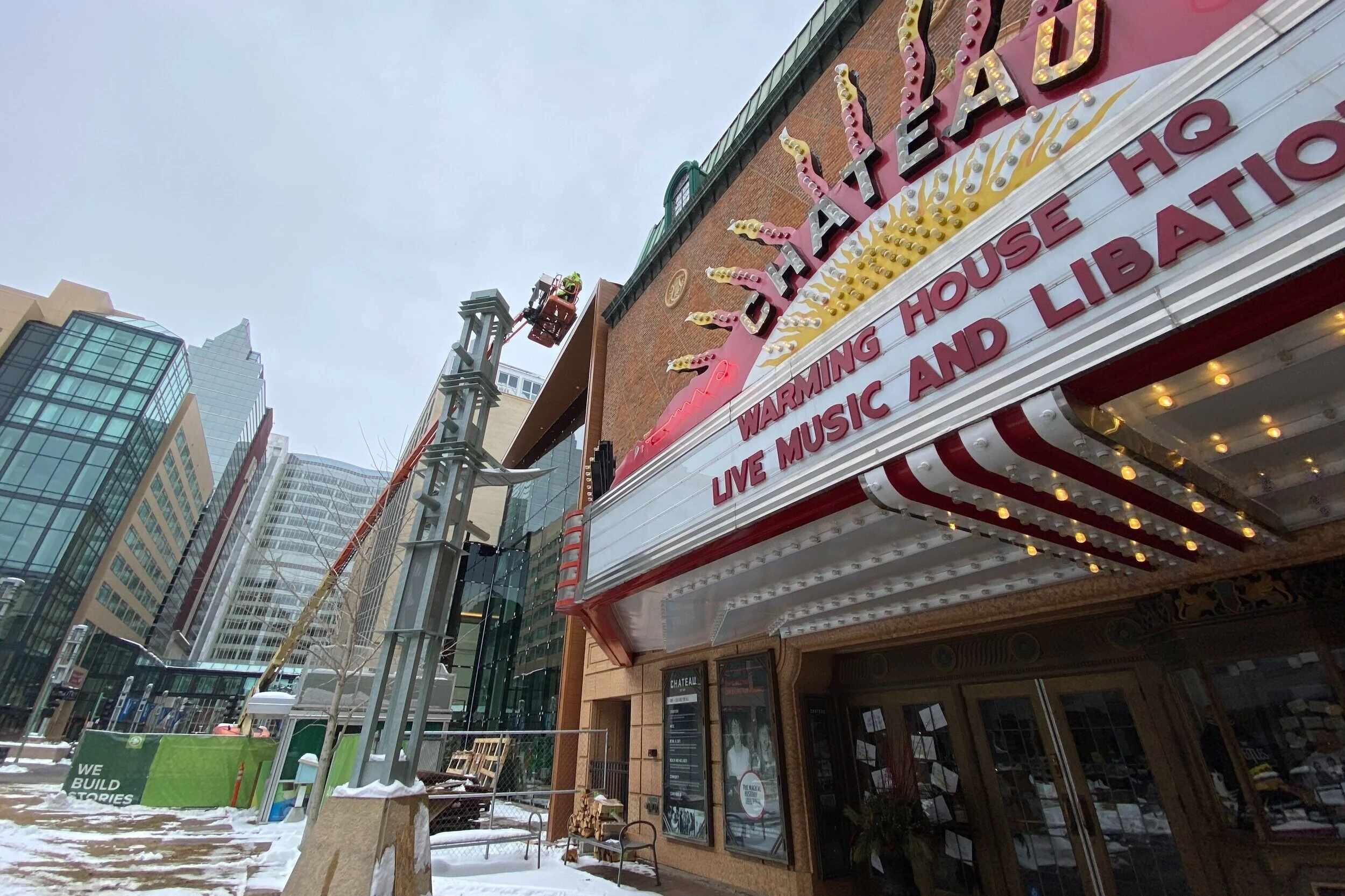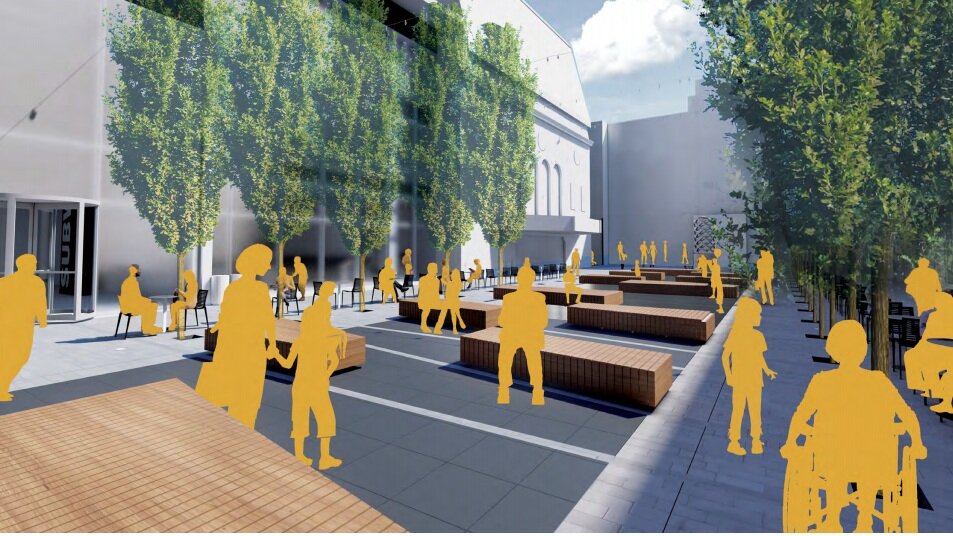Small businesses are the lifeblood of the Heart of the City. What can be done to ensure their survival?
Eben Yamoa came here because he saw an opportunity.
His restaurant Jerk King, which had been based entirely in Toronto, made its first foray onto American soil in Rochester — more specifically, in the former Mac’s Cafe space on Peace Plaza. In the nine months since Jerk King’s grand opening this past May, Yamoa says locals and visitors alike have made the American gamble a successful one.
“Our business has changed with the seasons,” said Yamoa, “but we had very high traffic in the summer. We had a lot of Mayo [employees] in the summer for lunch, but now our dinner traffic’s increased in the winter. We get locals in the evenings now. I’m excited to finish a year and see where things go.”
However, as Yamoa’s restaurant celebrates a year of business, Rochester’s heart will head into surgery, as construction for the Heart of the City project commences. The possible financial complications have business owners and DMC officials considering the best ways to support the establishments at the epicenter.
DMC officials are now asking for an 8 percent “cost premium” — by taking the original $15 million budget, approximately an extra $1.2 million — to support what they call a “Business Forward” initiative. Through additional investments in accessibility and safety, increased communication, and new programming in the Peace Plaza area, they hope to help the existing businesses weather the storm to come and reap the benefits of a revitalized downtown.
Patrick Seeb, DMC’s director of economic development and placemaking, said the initiative would be critical to ensuring small businesses make it through the construction phase — which is best for everyone involved.
“It’s a lot cheaper to help current businesses succeed than to recruit new ones,” said Seeb.
Exact methods are still being flushed out, though Seeb suggested several potential ways the Business Forward initiative could be implemented — such as making sure sidewalks stay clear and open to foot traffic, doing work directly in front of entrances outside of a business’s hours, and helping affected businesses advertise in and around the construction zone.
Construction to start this summer
The Heart of the City plan has been one of DMC’s core proposals since the beginning of the 20-year initiative in 2013. The first of two construction phases will tackle Peace Plaza and the First Avenue/Wells Fargo corridor. Safety and accessibility are core tenets of the overhaul, as we reported back in May. Renderings of the finished remodel show tree-lined, curbless streets, with over $3 million in public art slated for the new space — a full 20 percent of the project’s price tag (without the proposed cost premium).
Jamie Rothe, DMC’s director of community engagement and experience, said the project aims to give Rochester an easily identifiable city center on a daily basis, filling the gaps left by popular events like Thursdays Downtown and SocialICE.
“Rochester has been looking for a center of gravity,” said Rothe. “We already have one on certain days, but we need one every single day.”
Rendering of the planned Heart of the City makeover
That main aforementioned “center of gravity” has been Thursdays Downtown in recent summers. This year, however, the popular street fair will move south down First Avenue to avoid the Peace Plaza construction. While DMC says nothing has been set in stone for added Peace Plaza programming in 2020, they have reached out to local partners like the Rochester Downtown Alliance and Chamber of Commerce to develop plans.
Losing Thursdays is a double whammy for operations like Jerk King, which have depended on consistent traffic on Thursdays (plus a steady stream of summertime foot traffic) to boost their balance sheets.
“Thursdays, in the evening this summer, were excellent,” said Yamoa. “Thursdays [the festival] gave us one good day every week. That’s being taken away, so what happens to the other six days?”
Those “other six days” are a cause for concern as well. Jerk King’s location on the north side of the 100 First Avenue building means their visibility from the road is low. Yamoa said he’s also worried about construction dust and sound (the mitigation of which was noted by DMC as a “top priority”) keeping Mayo employees and patients in the skyways, which Jerk King isn’t connected to.
“There’s a high possibility that, because of the construction, people will stay in the skyways to get wherever they need to go,” said Yamoa. “So, any added visibility must include the skyway for small businesses on the ground that are in the middle of the construction. That's my question — how can they channel traffic down from the skyway?”
Neighbors supporting neighbors
One programming initiative from December, as Seeb noted, took place at the Chateau Theatre, when DMC paid admission fees to Chateau’s Beatles exhibit every Monday for a month. “Chateau on Us” was intended to draw people to Peace Plaza — not only for the Beatles exhibit, but to visit different restaurants and shops in the area. (Yamoa said Mondays have been one of Jerk King’s most successful days in the winter.)
Kellen Nixon, VP of community engagement for Exhibits Development Group (which operates the Chateau) said the group’s goal for 2020 is to have 50 “free days” of exhibits, sponsored by various city organizations. DMC sponsored the first one (coincidentally, the last Free Mondays event) and Mayo Clinic has signed on for four more.
It’s part of a symbiotic relationship, Nixon explains, between Chateau and the other businesses on Peace Plaza.
“Any time we cater, we cater with Jerk King,” said Nixon. “Any time we need coffee for the Rotary Club, we go to Moka. We see ourselves as a part of this downtown corridor family, but more importantly, we also want to leverage what we have for the growth of those around us. We don’t want it to be a situation where we’re doing crazy numbers, but it’s crickets across the street.”
In last week’s DMC Corp. board meeting, board chair R.T. Rybak called on the public to go out of their way to support affected businesses. (“If you really care about these owners, go spend money there,” said Rybak.) Yamoa said the board chair was “completely correct,” and offered his own reasoning for coming to the same conclusion: without a strong heart, nothing can thrive.
“Regardless of your geography, regardless of where you live, what happens downtown affects all of us,” said Yamoa. “When good things happen here, everyone benefits, but for good things to happen here, everyone will have to be a part of it. We are your neighbors, and neighbors help each other. It’s downtown today, but it could be another neighborhood tomorrow.”
Isaac Jahns is a Rochester native and a 2019 graduate of the Missouri School of Journalism. He reports on politics, business and music for Med City Beat.









